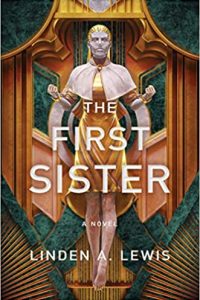Ian Mond Reviews Jawbone by Mónica Ojeda
 Jawbone, Mónica Ojeda (Coffee House Press 978-1-56689-621-4, $16.95, 272pp, tp) February 2022.
Jawbone, Mónica Ojeda (Coffee House Press 978-1-56689-621-4, $16.95, 272pp, tp) February 2022.
On occasion, I’ve been known to make bold pronouncements in this column. Back in January, I crowned John Darnielle’s Devil House as one of the best books of the year, having read less than a handful of novels published in 2022. Three months later and I stand by that proclamation. Having just finished Mónica Ojeda’s Jawbone, translated by Sarah Booker, I’m ready to make my second pronouncement for 2022. The Ecuadorian author’s third novel (and first to be translated into English) is the most disturbing book I will encounter this year. In fact, it might be the most harrowing novel I’ve read in a decade, putting it in front of head-spinning works like Samanta Schweblin’s Fever Dream or Grégoire Courtois’s The Laws of the Skies.
Jawbone starts with a teenage girl tied to a chair. Her name is Fernanda, and her kidnapper is not some dangerous man with a penchant for young girls, but her school teacher: Miss Clara López Valverde. The unfolding narrative explains how we come to be in this somewhat desperate predicament. We’re first told about the friendship between Fernanda and Annelise, two rebellious teenagers from wealthy families who attend the Delta Bilingual Academy High School for Girls. When not driving their teachers to distraction, Fernanda, Annelise, and the girls that orbit them – Analía, Natalia, Ximena, and Fiorella – spend their time in an abandoned three-story building that Annelise refers to as their ‘‘lair.’’ It’s a place where they tell each other ghost stories, obsesses about creepypastas (modern urban legends) and challenge each other to dares. It’s on the second floor of the building, in a room Fernanda has painted white, that Annelise develops a theology about the White God, an entity that ‘‘only revealed Themselves to girls their age, and the vision was so disturbing that it transformed them forever.’’ Running alongside Annelise and Fernanda’s back-story are chapters tightly focussed on the intense and distressing thoughts of their teacher, Miss Clara. She has joined the elite bilingual institution, leaving her role at a poorer school after two of her students broke into her house and tortured her. This traumatic event is in addition to Miss Clara’s horrible childhood where she was psychologically abused by her mother. Given her state of mind, Miss Clara is the last person who should be educating a group of privileged and entitled rich girls, especially Fernanda and Annelise, who drove their previous teacher to a nervous breakdown.
Since (and possibly before) the publication of Stephen King’s Carrie, female adolescence has been a rich source of material for typically male horror authors. Like those novels, Jawbone is undoubtedly a book that frames the onset of female desire and sexuality as terrifying and dangerous. But what’s so unique about Ojeda’s take is the influences she draws upon, namely H.P. Lovecraft and Herman Melville. In an incredible chapter about two-thirds of the way through the novel, we read an essay written by Annelise where she offers an ontological comparison between Lovecraft’s cosmic horror and her conception of ‘‘white horror.’’ She notes that while both have this ability to ‘‘implode language’’ because they defy description, white horror, unlike cosmic horror, also ‘‘anticipates terrible things that cannot be known… in other words, white is like silence in a horror movie: when it appears you know something awful is about to happen.’’ What’s shocking about Annelise’s essay is how coherent and whip-smart it is, both the erudite literary criticism (not just Lovecraft, but also Melville and horror tropes more broadly) and its clever subversion of white as a metaphor for purity.
Jawbone is also a book about pain, trauma, and cruelty. This comes across most clearly through Miss Clara, whose identity, much like Norman Bates, has been subsumed by the ‘‘teachings’’ and harsh discipline of her dead mother to the extent that ‘‘Clara adopted all her things, even her [mother’s] undergarments.’’ Ojeda’s depiction of Clara’s interior thoughts as long, multi-clause sentences suggestive of a mind in a constant state of anxiety is as extraordinary as it is upsetting. There’s also a great deal of untapped trauma in the toxic relationship between Annelise and Fernanda, which we gain a better appreciation of through Fernanda’s sessions with her therapist (rather brilliantly, we only get the teenager’s side of the conversation). Here, we see Fernanda struggling to come to terms with her desire for Annelise while gradually recognising the destructive and cruel nature of their friendship.
Aside from applauding their work, I don’t typically judge translations, because as someone who only speaks and reads in one language, it’s impossible for me to separate the translator’s choices from the inherent quality of the source material. However, in the case of Jawbone, it’s clear that Booker has put in a tremendous effort to get across Ojeda’s intent. This is especially evident in a set-piece involving an underage jaunt to a nightclub where the girls meet and taunt a group of college boys. Not only is this a tense scene, but it’s one where the perspective constantly shifts between the six teenagers while also, somehow, flashing back in time to the disturbing goings-on in the white room. It’s a remarkable bit of writing that English readers would never have experienced without the care and talent of Sarah Booker.
Given the distressing subject matter, Jawbone will not be for everyone. But as an example of top-grade horror (and frankly top-grade literature), there’s very little that will be published this year, or any year, that will surpass this devastating novel.
Ian Mond loves to talk about books. For eight years he co-hosted a book podcast, The Writer and the Critic, with Kirstyn McDermott. Recently he has revived his blog, The Hysterical Hamster, and is again posting mostly vulgar reviews on an eclectic range of literary and genre novels. You can also follow Ian on Twitter (@Mondyboy) or contact him at mondyboy74@gmail.com.
This review and more like it in the April 2022 issue of Locus.
 While you are here, please take a moment to support Locus with a one-time or recurring donation. We rely on reader donations to keep the magazine and site going, and would like to keep the site paywall free, but WE NEED YOUR FINANCIAL SUPPORT to continue quality coverage of the science fiction and fantasy field.
While you are here, please take a moment to support Locus with a one-time or recurring donation. We rely on reader donations to keep the magazine and site going, and would like to keep the site paywall free, but WE NEED YOUR FINANCIAL SUPPORT to continue quality coverage of the science fiction and fantasy field.
©Locus Magazine. Copyrighted material may not be republished without permission of LSFF.







